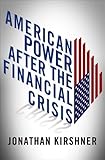American Power after the Financial Crisis / Jonathan Kirshner.
Material type: TextSeries: Cornell Studies in MoneyPublisher: Ithaca, NY : Cornell University Press, [2014]Copyright date: ©2014Description: 1 online resource (232 p.)Content type:
TextSeries: Cornell Studies in MoneyPublisher: Ithaca, NY : Cornell University Press, [2014]Copyright date: ©2014Description: 1 online resource (232 p.)Content type: - 9780801454790
- Global Financial Crisis, 2008-2009 -- Political aspects
- National security -- Economic aspects -- United States
- National security -- Economic aspects -- United States
- General Economics
- Political Science & Political History
- POLITICAL SCIENCE / Political Economy
- 2008 economic crash, world economic politics, international balance of power, financial deregulation, united states political influence, american economic vulnerability, financial policy, economic collapse, global economy
- 337.73 23
- online - DeGruyter
| Item type | Current library | Call number | URL | Status | Notes | Barcode | |
|---|---|---|---|---|---|---|---|
 eBook
eBook
|
Biblioteca "Angelicum" Pont. Univ. S.Tommaso d'Aquino Nuvola online | online - DeGruyter (Browse shelf(Opens below)) | Online access | Not for loan (Accesso limitato) | Accesso per gli utenti autorizzati / Access for authorized users | (dgr)9780801454790 |
Browsing Biblioteca "Angelicum" Pont. Univ. S.Tommaso d'Aquino shelves, Shelving location: Nuvola online Close shelf browser (Hides shelf browser)

|

|

|

|

|

|

|
||
| online - DeGruyter Zoned in the USA : The Origins and Implications of American Land-Use Regulation / | online - DeGruyter Against Immediate Evil : American Internationalists and the Four Freedoms on the Eve of World War II / | online - DeGruyter A Tremendous Thing : Friendship from the "Iliad" to the Internet / | online - DeGruyter American Power after the Financial Crisis / | online - DeGruyter Songs of the Factory : Pop Music, Culture, and Resistance / | online - DeGruyter Northern Men with Southern Loyalties : The Democratic Party and the Sectional Crisis / | online - DeGruyter What Galileo Saw : Imagining the Scientific Revolution / |
Frontmatter -- Contents -- Preface -- 1. The Global Financial Crisis As World Politics -- 2. Learning From The Great Depression -- 3. From The First To The Second Us Postwar Order -- 4. Seeds Of Discord: The Asian Financial Crisis -- 5. The New American Model And The Financial Crisis -- 6. The Crisis And World Politics -- 7. The Crisis And The International Balance Of Power -- 8. Conclusions, Expectations, And Speculations -- Notes -- Index
restricted access online access with authorization star
http://purl.org/coar/access_right/c_16ec
The global financial crisis of 2007–2008 was both an economic catastrophe and a watershed event in world politics. In American Power after the Financial Crisis, Jonathan Kirshner explains how the crisis altered the international balance of power, affecting the patterns and pulse of world politics. The crisis, Kirshner argues, brought about an end to what he identifies as the "second postwar American order" because it undermined the legitimacy of the economic ideas that underpinned that order—especially those that encouraged and even insisted upon uninhibited financial deregulation. The crisis also accelerated two existing trends: the relative erosion of the power and political influence of the United States and the increased political influence of other states, most notably, but not exclusively, China.Looking ahead, Kirshner anticipates a "New Heterogeneity" in thinking about how best to manage domestic and international money and finance. These divergences—such as varying assessments of and reactions to newly visible vulnerabilities in the American economy and changing attitudes about the long-term appeal of the dollar—will offer a bold challenge to the United States and its essentially unchanged disposition toward financial policy and regulation. This New Heterogeneity will contribute to greater discord among nations about how best to manage the global economy. A provocative look at how the 2007–2008 economic collapse diminished U.S. dominance in world politics, American Power after the Financial Crisis suggests that the most significant and lasting impact of the crisis and the Great Recession will be the inability of the United States to enforce its political and economic priorities on an increasingly recalcitrant world.
Mode of access: Internet via World Wide Web.
In English.
Description based on online resource; title from PDF title page (publisher's Web site, viewed 26. Apr 2024)


